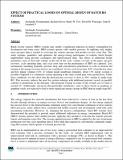EFFECT OF PRACTICAL LOSSES ON OPTIMAL DESIGN OF BATCH RO SYSTEMS
Author(s)
Stover, Richard; Swaminathan, Jaichander; Tow, Emily W.; Warsinger, David Elan Martin; Lienhard, John H.
DownloadLienhard_Effect of practical losses on optimal design of batch RO systems Swaminathan 2017.pdf (734.6Kb)
OPEN_ACCESS_POLICY
Open Access Policy
Creative Commons Attribution-Noncommercial-Share Alike
Terms of use
Metadata
Show full item recordAbstract
Batch reverse osmosis (BRO) systems may enable a significant reduction in energy consumption for desalination and water reuse. BRO systems operate with variable pressure, by applying only slightly more pressure than is needed to overcome the osmotic pressure and produce reverse water flux. This study explains, quantifies, and optimizes the energy-saving performance of realistic batch designs implemented using pressure exchangers and unpressurized tanks. The effects of additional design parameters such as feed tank volume at the end of the cycle, volume of water in the pipes, per-pass recovery, cycle operating time, and cycle reset time on the performance of BRO are captured. Loss mechanisms including hydraulic pressure drop and concentration polarization as well as friction and mixing in the energy recovery devices are considered. At low cycle-reset time (10% of productive time)
and low piping volumes (12% of volume inside membrane elements), about 13% energy savings is possible compared to a continuous system operating at the same overall pure water productivity. Under these conditions, we also show that the ideal per-pass recovery is close to 50%, similar to single-stage RO. This recovery reduces the need for system redesign with additional pressure vessels in parallel,
contrary to predictions in the literature. The projected savings in terms of the overall cost of water is around 3%. Additionally, advanced ultra-permeable membranes, such as those based on graphene or graphene oxide, are expected to lead to more significant energy savings in BRO than in single-stage RO.
Date issued
2017-10Department
Massachusetts Institute of Technology. Department of Mechanical EngineeringJournal
The International Desalination Association World Congress
Publisher
International Desalination Association
Citation
Swaminathan, Jaichander, Stover, Richard; Tow, Emily W., Warsinger, David M. and Lienhard, John H. "EFFECT OF PRACTICAL LOSSES ON OPTIMAL DESIGN OF BATCH RO SYSTEMS." The International Desalination Association World Congress, October 15-20, 2017, Sao Pauelo, Brazil, International Desalination Association, 2017
Version: Author's final manuscript